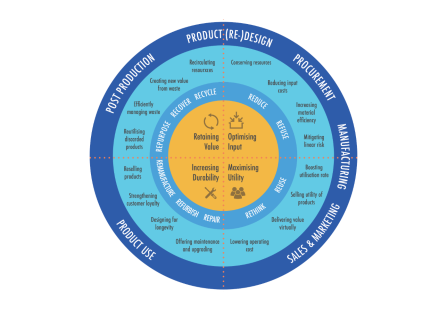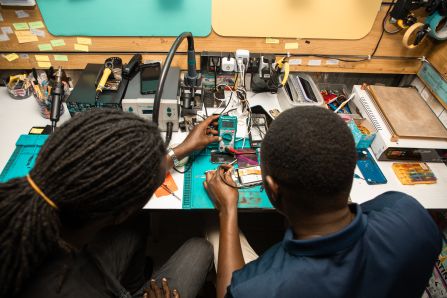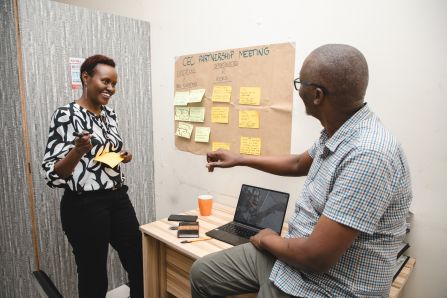SME Stories: How SMEs in India and Kenya Can Thrive in the Circular Economy
| Date |
Date
|
The path to success for small and medium-sized enterprises (SMEs) is not just about profit. It is about sustainability, innovation, and resilience. The Circular Economy Catalyst (CEC) equips SMEs in India and Kenya with the tools they need to thrive in a world where waste reduction and resource optimisation are key to long-term prosperity. Through a series of case study videos, CEC highlights the journeys of green enterprises, offering invaluable lessons for entrepreneurs looking to break into the circular economy.
India: Building a Roadmap to Circular Success
1. Understanding the Circular Economy Taxonomy: The Future of Sustainable Business
Successful businesses do not just follow trends. They redefine them. The Circular Economy Taxonomy provides a clear framework for companies to transition from the outdated "take, make, dispose" model to an approach rooted in sustainability. By extending product lifecycles, optimising resource use, and reducing waste, enterprises can create a lasting impact.
Idobro Impact Solutions, CEC’s implementing partner in India, presents this structured approach, guiding SMEs to identify their roles in the circular economy.

2. Collaborating for Change: Circular Economy Ecosystem Partnerships in India
No business succeeds in isolation. India’s future lies in its non-metro, semi-urban, and rural regions, where untapped entrepreneurial potential is booming. Deshpande Startups, based in Hubli, Karnataka, is at the forefront of supporting these rising changemakers.
In partnership with CEC, Deshpande Startups hosted a Training of Trainers programme, introducing entrepreneurs to circular economy principles.
3. Bringing Circular Economy & Business Innovation to Tier 2 and 3 Cities
Scaling a business in a Tier 2 or 3 city presents unique challenges, including limited access to funding, fewer networks, and gaps in technical know-how. However, where there are challenges, there are also opportunities.
The Circular Economy Catalyst programme bridges these gaps by offering hands-on business support, training, and advisory services.

Kenya: Transforming Challenges into Opportunities
1. CEC: Partnerships in the Circular Economy in Kenya
Collaboration is a powerful driver of success in the circular economy. Loopworks Ventures, CEC’s implementing partner in Kenya, provides business advisory services to support SMEs in adopting circular business models. Their expertise spans resource efficiency, circular production, co-creation, and compliance with sustainability standards.
Additionally, Nia Ventures plays a crucial role in Kenya’s entrepreneurship ecosystem. It offers business training and consultancy to help innovators turn their ideas into scalable enterprises with a triple impact: social, environmental, and economic.
2. VAWOCO Organisation: Providing Affordable, Refurbished Smartphones to Communities in Kenya
E-waste is a growing global challenge, but VAWOCO Organisation is proving that extending product lifecycles is both a sustainable and profitable business model. By refurbishing and reselling smartphones at affordable prices, VAWOCO is making digital access more inclusive while reducing electronic waste.
Beyond product sales, the organization also empowers individuals by offering training and certification in phone repair. This creates new job opportunities while keeping valuable electronic components in circulation.

3. Zihanga: Converting Organic Waste into Valuable Resources in Kenya
Zihanga is redefining sustainable agriculture in Kenya by transforming organic waste into valuable products. Through its circular business model, the company bio-converts organic waste into black soldier fly larvae meal, a sustainable protein source, and frass fertiliser, which supports eco-friendly farming practices.
Zihanga also addresses social challenges by offering affordable chicken colony cages integrated with horizontal gardens and fly nets.
Lessons from Circular Economy Enterprises
The success stories of these enterprises highlight key strategies that SMEs can adopt to create thriving circular businesses:
- Adopt a Circular Mindset: Look beyond traditional business models and find ways to repurpose waste, extend product lifecycles, and reduce resource consumption.
- Leverage Local Ecosystems: Partner with like-minded organisations, mentors, and business networks to accelerate growth and sustainability impact.
- Focus on Practical Innovation: Whether it is turning organic waste into fertiliser or refurbishing electronics, successful circular businesses provide tangible, scalable solutions.
- Empower People Through Knowledge: Training and mentorship programmes help entrepreneurs and workers gain the skills necessary to implement circular economy principles effectively.

Paving the Way for a Sustainable Future
The Circular Economy Catalyst is helping SMEs in India and Kenya redefine success by integrating sustainability into their core business strategies. From innovative product development to ecosystem collaboration, these enterprises prove that green business models can be both profitable and impactful. By embracing the circular economy, SMEs can build resilient businesses that not only thrive today but also contribute to a more sustainable future for generations to come. Entrepreneurs worldwide now have the opportunity to learn from these pioneers and take their first steps toward circular success.
